
Thomas Carey (1597 - 1634) was a courtier to Charles I and English Member of Parliament.

Thomas Carey (1597 - 1634) was a courtier to Charles I and English Member of Parliament.
He was born 16 September 1597, the second son of Robert Carey, 1st Earl of Monmouth and Elizabeth Trevannion. [1] He was tutored within his father's household by Henry Burton. [2] He became groom of the bedchamber to Charles, then Prince of Wales, in 1616 and retained that post until his death. [1] In 1617 he was sent with Sir John Digby to Madrid and subsequently travelled in France and Germany. [1] When Giles Mompesson was expelled from his parliamentary seat of Great Bedwyn in 1621, he was returned at the subsequent by-election as the Court candidate despite his lack of local connections. [3] In 1623 he was sent to Madrid in the wake of Prince Charles and Buckingham. [4]
Between 1624 and 1929 Carey was elected for Cornish constituencies through the influence of his mother's links to the local gentry. He represented Helston (1624–25), Tregony (1625–26) and St Mawes (1628–29). [1] He was granted Sunninghill Park in Berkshire by the king in 1630. [5] Carey was preparing to go on embassy to Venice, when his health failed and he died in 1634. [1] He was buried in Westminster Abbey. [1]
Carey married, Margaret, daughter of the Master of Requests, Thomas Smith of Abingdon, Berkshire (now Oxfordshire) & Parson's Green, Middlesex and his wife, Frances, later Countess of Exeter. They had three daughters: [5]
After Carey died, Margaret married Sir Edward Herbert. [6]
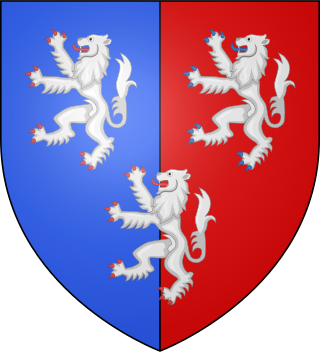
Sir Edward Herbert of Aston in Montgomeryshire, was an English lawyer and politician who sat in the House of Commons at various times between 1621 and 1641. He was Attorney-General under King Charles I.

Sir William Brooke, 10th Baron Cobham, KG, lord of the Manor of Cobham, Kent, was Lord Warden of the Cinque Ports, and a member of parliament for Hythe. Although he was viewed by some as a religious radical during the Somerset Protectorate, he entertained Queen Elizabeth I of England at Cobham Hall in 1559, signalling his acceptance of the moderate regime.

Catherine Carey, after her marriage Catherine Knollys and later known as both Lady Knollys and Dame Catherine Knollys,, was chief Lady of the Bedchamber to Queen Elizabeth I, who was her first cousin.

Thomas Howard, 1st Earl of Berkshire was an English politician who sat in the House of Commons between 1605 and 1622. He was created Earl of Berkshire in 1626.
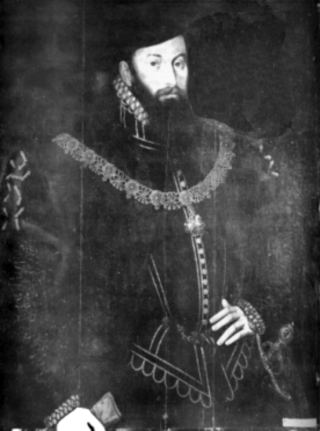
Thomas West, 2nd and 11th Baron De La Warr of Wherwell Abbey, Hampshire, was a member of Elizabeth I's Privy Council.

Sir Edmund Verney was an English politician, soldier and favourite of King Charles I. At the outbreak of the English Civil War he supported the Royalist cause and was killed at the Battle of Edgehill.

Edward Seymour, 1st Earl of Hertford, 1st Baron Beauchamp, KG, of Wulfhall and Totnam Lodge in Great Bedwyn, Wiltshire, of Hatch Beauchamp in Somerset, of Netley Abbey, Hampshire, and of Hertford House, Cannon Row in Westminster, is most noted for incurring the displeasure of Queen Elizabeth I by taking part in more than one clandestine marriage.
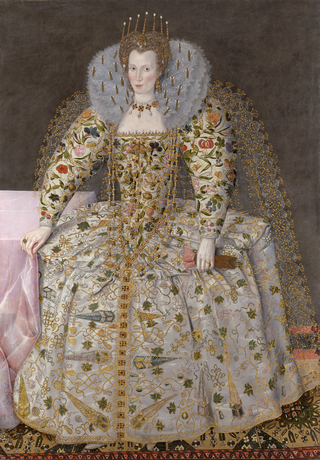
Catherine Howard, Countess of Nottingham, was a cousin, lady-in-waiting, and close confidante of Elizabeth I of England. She was in attendance on the queen for 44 years.

John Mordaunt, 1st Viscount Mordaunt was an English military officer and peer.
Lieutenant-General Harry Mordaunt was an English Army officer and Whig politician who sat in the English and British House of Commons between 1692 and 1720.
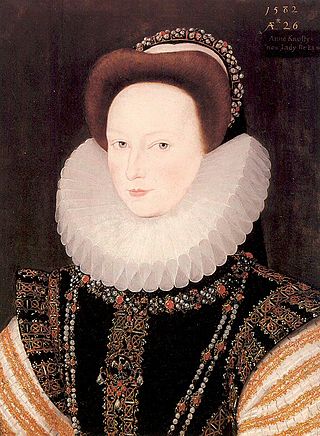
Anne West, Lady De La Warr was a lady at the court of Queen Elizabeth I of England.

Sir John St John, 1st Baronet of Lydiard Tregoze in the English county of Wiltshire, was a Member of Parliament and prominent Royalist during the English Civil War. He was created a baronet on 22 May 1611.

Sir Heneage Finch was an English nobleman, lawyer, Member of Parliament, and politician who sat in the House of Commons at various times between 1607 and 1626. He was Speaker of the English House of Commons in 1626.
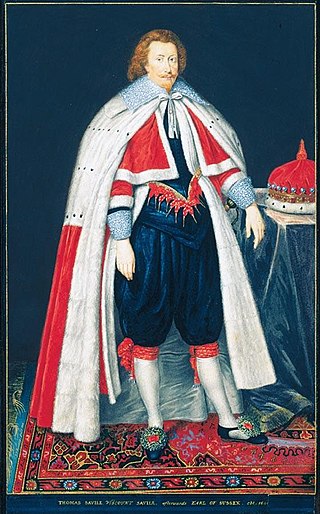
Thomas Savile, 1st Earl of Sussex was an English politician.

Lady Elizabeth Danvers née Neville, later Lady Elizabeth Carey by remarriage (1545/50–1630) was an English noblewoman. She was the mother of Sir Charles Danvers, executed in 1601 for his part in the rebellion of Robert Devereux, 2nd Earl of Essex, and of Sir John Danvers, one of the commissioners who tried King Charles I and signed the King's death warrant.

Oliver St John, 1st Earl of Bolingbroke, KB, known from 1618 until 1624 as 4th Baron St John of Bletso, was an English nobleman and politician.

Frances Newton, Baroness Cobham was an English aristocratic woman who served Queen Elizabeth I of England as a Lady of the Bedchamber, and was one of her closest female friends. She was the second wife of William Brooke, 10th Baron Cobham.
Thomas Fairfax, 1st Viscount Fairfax of Emley JP was an English landowner and politician who sat in the House of Commons at various times between 1601 and 1626. He was created Viscount Fairfax in the Peerage of Ireland in 1629. He "erected a mansion on Bishophill (York) early in Elizabeth's reign".
Sir Sigismund ZinzanaliasSir Sigismund Alexander was an equerry to Queen Elizabeth I and a champion in the tiltyard who participated in tournaments during the latter years of Queen Elizabeth's reign and throughout the reign of King James. He was the stepfather of Sir Matthew Brend, owner of the Globe Theatre, and during the years 1624-7 was himself the effective owner of the Globe.

The Cromwell family is an English aristocratic family descended from Hugh de Cromwell who came to England with William the Conqueror. Its most famous members are: Thomas Cromwell, 1st Earl of Essex; and, Oliver Cromwell, the Lord Protector. The line of Oliver Cromwell descends from Richard Williams, son of Thomas Cromwell's sister Katherine and her husband Morgan Williams.